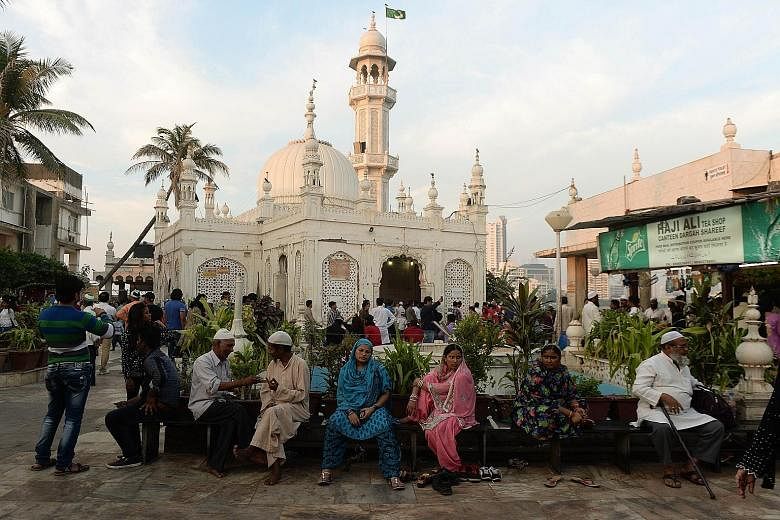MUMBAI • A landmark mosque in Mumbai is facing pressure to overturn a ban on women entering its inner sanctum, a move that could set a precedent on gender restrictions to places of worship in deeply religious India.
A Muslim women's rights group is locked in a bitter legal battle with trustees of Mumbai's Haji Ali Dargah, built in the 15th century and popular with not only Muslims but also Hindu devotees and tourists.
Women have been prevented from entering the mausoleum of the mosque since 2011, with its trust saying female proximity to the tomb of a saint is "a grievous sin" in Islam.
Bharatiya Muslim Mahila Andolan (BMMA), the rights group, has petitioned the Bombay High Court seeking a ruling that the ban is unconstitutional, hoping such a decision would mark a step forward for women's rights in India.
"A positive ruling would set a precedent and would have a wider and long-term effect," said BMMA co-founder Noorjehan Niaz. "It would send a message and encourage women of all religions who are barred from entering places of worship to approach courts with similar demands."
The mosque was built in the 1430s in memory of a wealthy Muslim who gave up his worldly possessions and went on a pilgrimage to Mecca.
Legend has it that Pir Haji Ali Shah Bukhari, who became a Sufi saint, died during his spiritual journey and his body washed up on rocks in the Arabian Sea off south Mumbai.
The mosque was constructed on the spot where his body was found - and his tomb lies in the inner sanctum, the mosque's most sacred place. It is one of a string of temples and mosques across India that restrict access to women.
Ms Niaz said the trust started banning women from the mausoleum four years ago, although they are still allowed into the mosque's other areas. She said trustees cited menstruation as the reason for barring women from sacred spots.
"They've said women are impure. But menstruation is a natural event and responsible for the entirety of humanity being born. How can it be dirty? It's a ridiculous and demeaning argument."
A member of the trust declined comment, saying only that he hoped Mumbai's top court would settle the dispute when it holds its next hearing next Tuesday.
Mr Maulana Mustaqeem Azmi, a member of the non-profit All India Muslim Personal Law Board, said the rule was similar to those in other mosques. "To insist that they be allowed into the tomb is against the religion."
Human rights lawyers back the women, but are sceptical of whether they will win their case. Instead, they are pushing for a law making it illegal for any trust to bar entry to a public place of worship on the grounds of gender.
"There are lots of temples where women are not allowed. If you go through each individual case, it will be an endless exercise, so you have to have state intervention," said prominent Indian rights lawyer Mihir Desai.
"Courts also like to restrain themselves from ruling on religious issues. Whether the court will deliver a verdict in favour of the women is very doubtful."
AGENCE FRANCE-PRESSE

